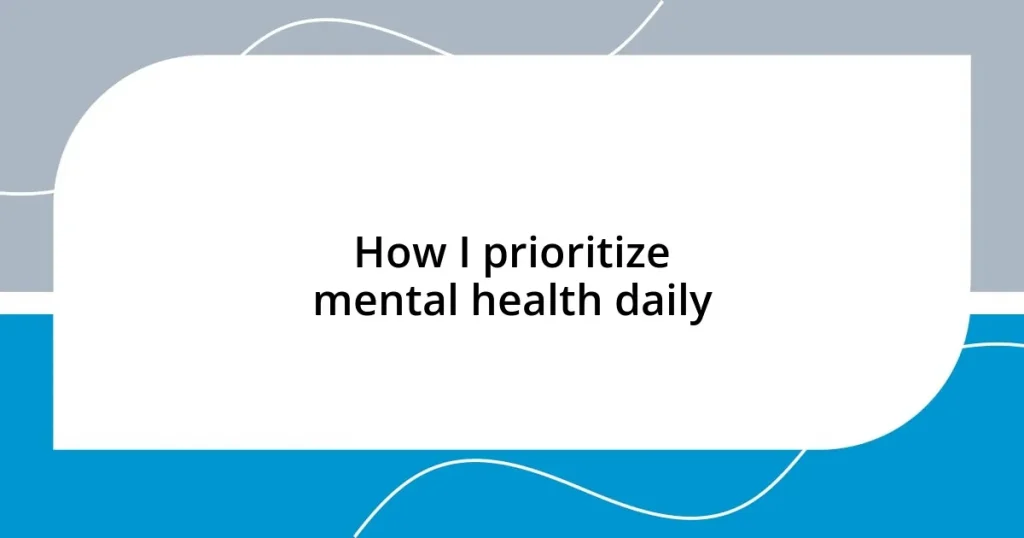Key takeaways:
- Prioritizing mental health is essential for overall well-being and can enhance creativity and focus.
- Daily practices like gratitude journaling, mindfulness meditation, and setting realistic goals contribute to improved mental health.
- Creating a supportive environment and maintaining healthy routines, including regular sleep, nutrition, and exercise, significantly impacts mental wellness.
- Regularly evaluating and adjusting mental health practices helps sustain motivation and effectiveness in self-care strategies.
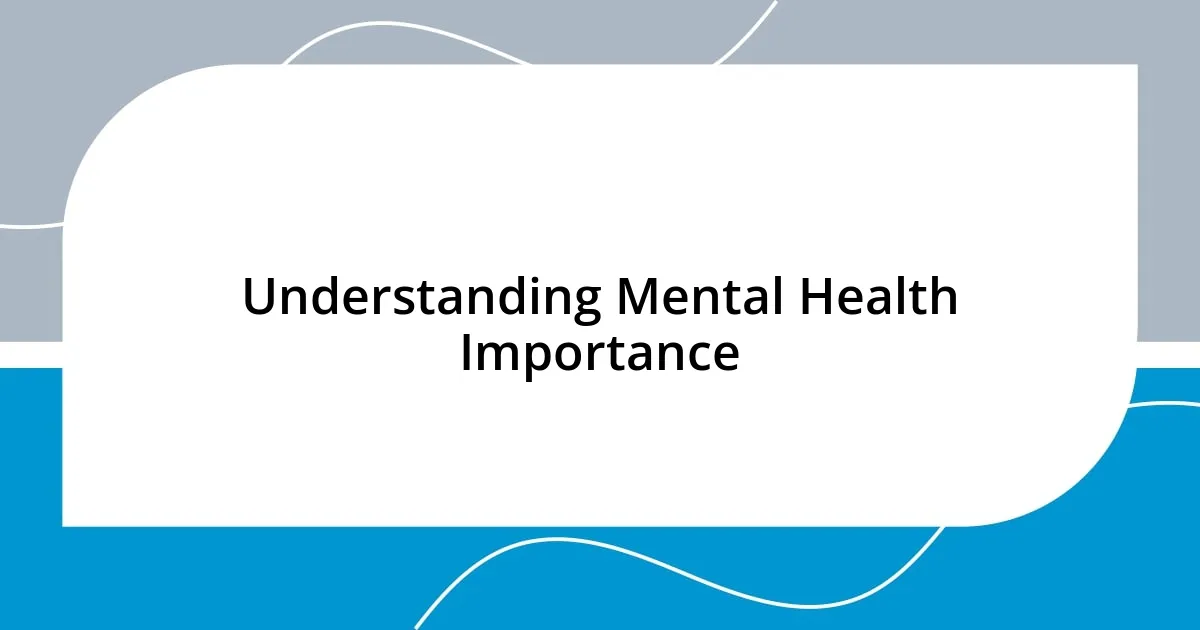
Understanding Mental Health Importance
Understanding the importance of mental health is a journey I’ve navigated personally. I remember a time when I brushed off my feelings, thinking they were trivial. But as I learned, neglecting mental health can lead to a ripple effect on our overall well-being, affecting everything from relationships to physical health.
Prioritizing mental health is not just beneficial; it’s essential. Have you ever considered how emotional well-being influences your daily productivity? When I take the time to prioritize my mental health, I notice a significant shift in my creativity and focus. It’s as if my mind clears up, allowing me to engage with the world more fully.
In my own experience, I find that understanding mental health creates a foundation for resilience. During challenging times, I’ve learned that acknowledging my feelings gives me strength, rather than weakness. It’s a reminder that mental health is a vital part of our human experience, deserving of attention and care each day.
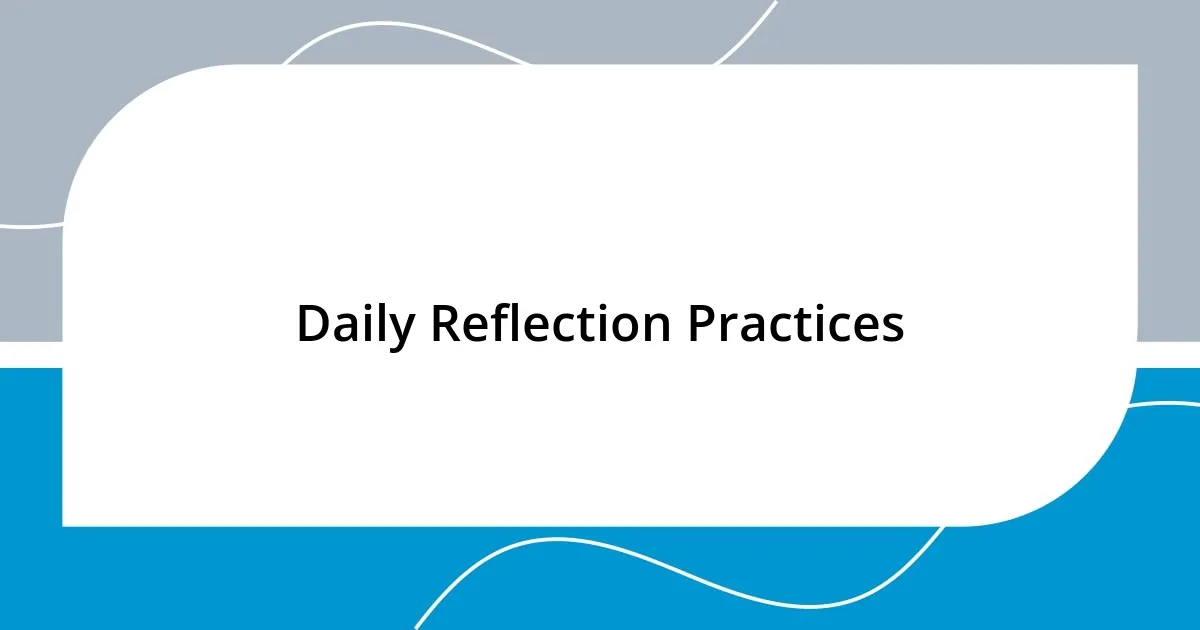
Daily Reflection Practices
Taking a moment each day to reflect on my thoughts and emotions has been transformative. I often begin my mornings with a few quiet minutes, sipping coffee while I jot down what I’m grateful for. This simple practice helps me set a positive tone for the day and reminds me of the good amidst daily chaos.
In the evenings, I prefer to revisit my day through journaling. I write about what went well and what challenged me. It’s interesting how much clarity comes from putting pen to paper; I can see patterns in my thoughts and feelings that I otherwise might overlook. This not only aids in processing my experiences but also helps me identify areas where I need to focus my attention for my mental well-being.
On days when I feel particularly overwhelmed, I find solace in a few minutes of mindfulness meditation. Taking a step back to breathe deeply and center myself creates a precious space for self-awareness. By reflecting on my feelings during these moments, I’ve discovered that acknowledging stress is often the first step towards finding balance—a lesson I cherish deeply.
| Reflection Practice | Benefits |
|---|---|
| Morning Gratitude | Sets a positive tone and promotes mindfulness. |
| Evening Journaling | Helps process experiences and identify patterns. |
| Mindfulness Meditation | Encourages self-awareness and stress management. |
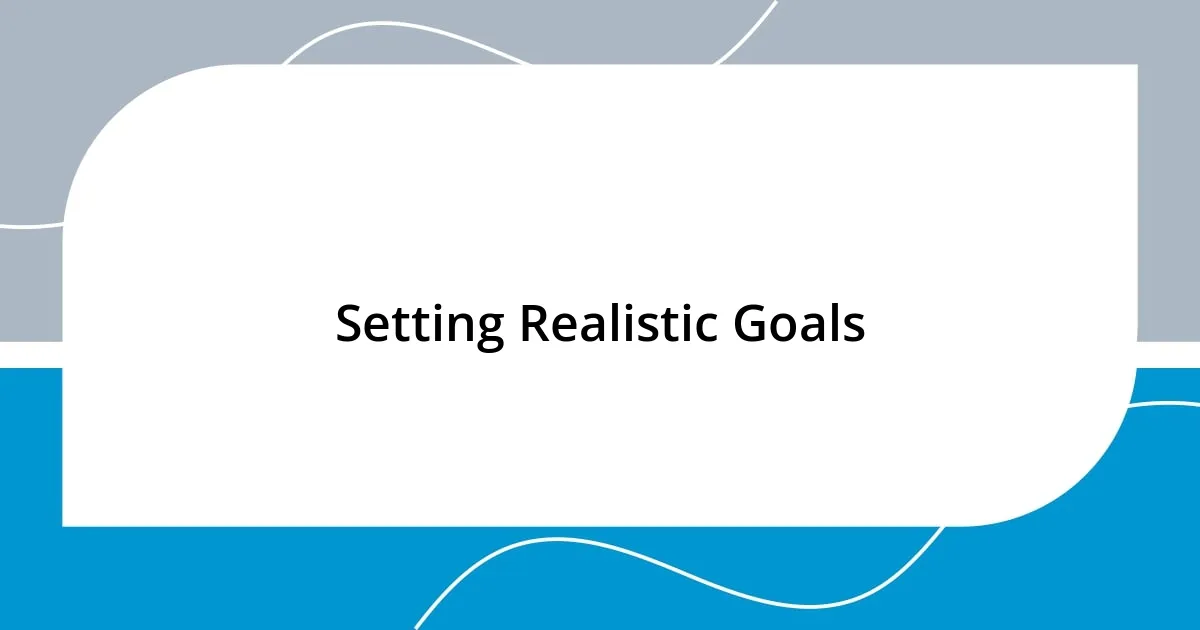
Setting Realistic Goals
Setting realistic goals is something I’ve come to appreciate deeply in my journey. Initially, I would set lofty, often unachievable expectations for myself, only to feel defeated when I couldn’t meet them. Over time, I’ve learned that breaking down my aspirations into manageable steps not only reduces overwhelm but also fosters a sense of accomplishment. Each small win fuels my motivation, reminding me that progress is a journey, not a sprint.
Here’s how I approach setting these realistic goals:
- Start Small: I focus on achievable tasks that I know I can accomplish within a day or a week.
- Be Specific: Instead of saying, “I want to be happier,” I define clear goals, like “I will take a 10-minute walk daily.”
- Limit Goals: I find it helpful to concentrate on two or three main objectives rather than spreading myself too thin.
- Reflect Regularly: Taking time to review what I’ve achieved helps me recognize my progress and make any necessary adjustments.
By integrating these strategies, I not only preserve my mental health, but I also cultivate a more meaningful sense of purpose in my daily life.
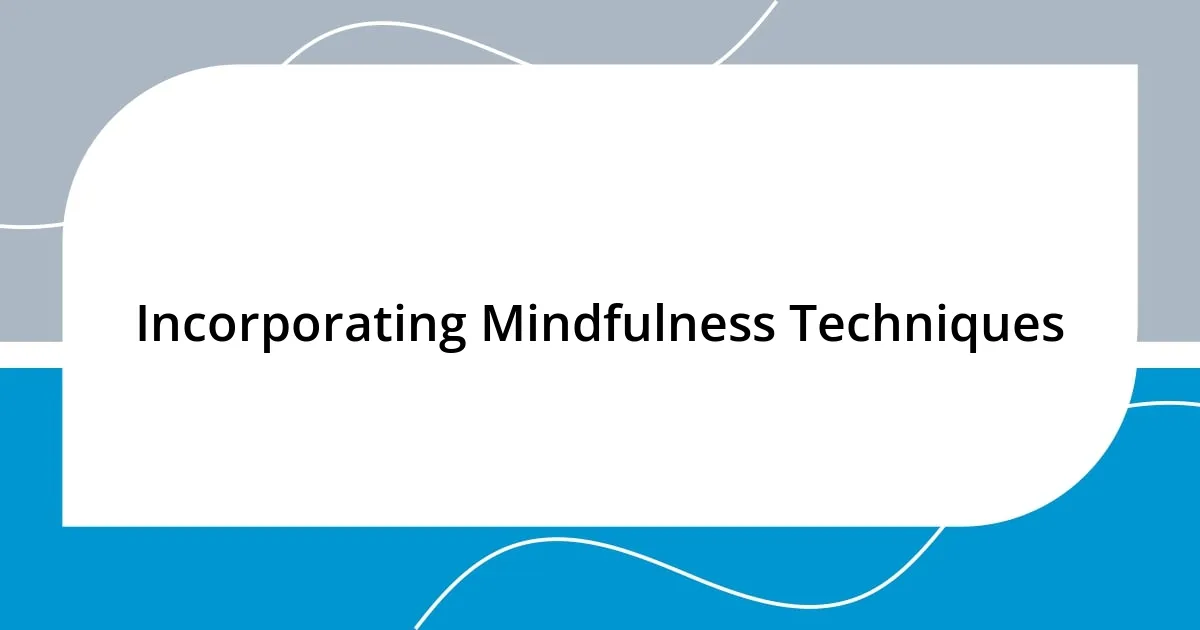
Incorporating Mindfulness Techniques
Incorporating mindfulness techniques into my daily routine has been a game-changer for my mental health. One practice I’ve embraced is mindful walking. There’s something grounding about focusing on the sensation of my feet meeting the ground while paying attention to my surroundings. Have you ever tried just walking without distraction? I often notice little details—like the sound of leaves rustling or the vibrant colors of flowers—that uplift my mood and help me feel more connected to the present.
Another method I find incredibly helpful is guided visualization. Just the other day, I took a break from my hectic schedule to close my eyes and imagine myself in a serene meadow. As I breathed deeply, I could almost feel the sun warming my skin and hear the gentle buzz of nature. This practice not only alleviates stress but also allows me to shift my mindset to one of abundance and peace. Have you noticed how your imagination can create pockets of tranquility even amid chaos?
Finally, I incorporate mindful eating into my day. During lunch, I intentionally slow down and savor each bite. It’s surprising how often I used to rush through meals, barely tasting my food. Now, I find joy in the texture and flavors, which helps me appreciate my meals more deeply. This little shift has made me more aware of my body’s hunger cues and enhanced my overall relationship with food. Isn’t it amazing how mindfulness can transform ordinary moments into extraordinary experiences?
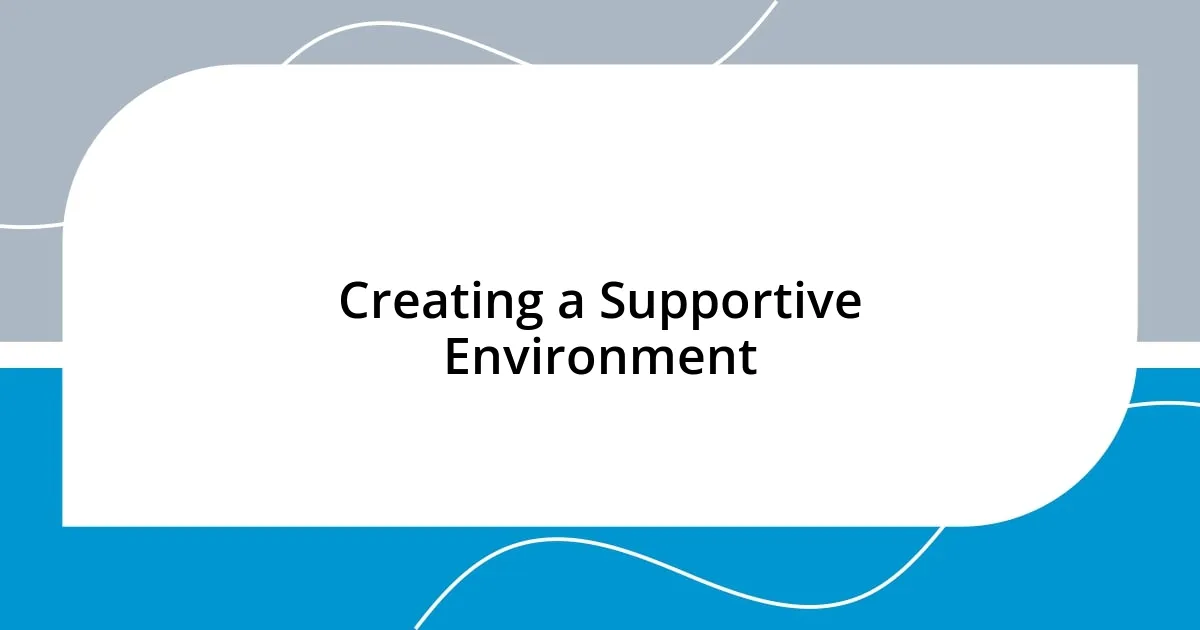
Creating a Supportive Environment
Creating a supportive environment is essential for nurturing mental health. I remember a time when my living space felt cluttered and chaotic, which only added to my stress. By simply decluttering and making my home more inviting—perhaps with some cozy blankets, plants, or art that resonates with me—I found that I could breathe easier and think more clearly. It’s fascinating how our surroundings can directly impact our state of mind, isn’t it?
Another aspect I’ve embraced is building a strong support network. I’ve made a conscious effort to surround myself with positive and uplifting people who encourage me. For example, I started a weekly coffee catch-up with friends who provide both laughter and thoughtful conversations. These moments not only lift my spirits but also serve as a reminder that I’m not alone in my struggles. Have you considered reaching out to friends or family to share your thoughts? You might be surprised at how a simple chat can brighten your day.
Moreover, I’ve learned that setting boundaries in relationships can greatly enhance my mental well-being. There were times when I felt drained by toxic interactions, but now I prioritize my peace. By saying no when I need to and seeking out connections that fuel my energy, I’m creating a space where I can flourish. It’s been liberating to realize that I have control over my social environment—how empowering is that?
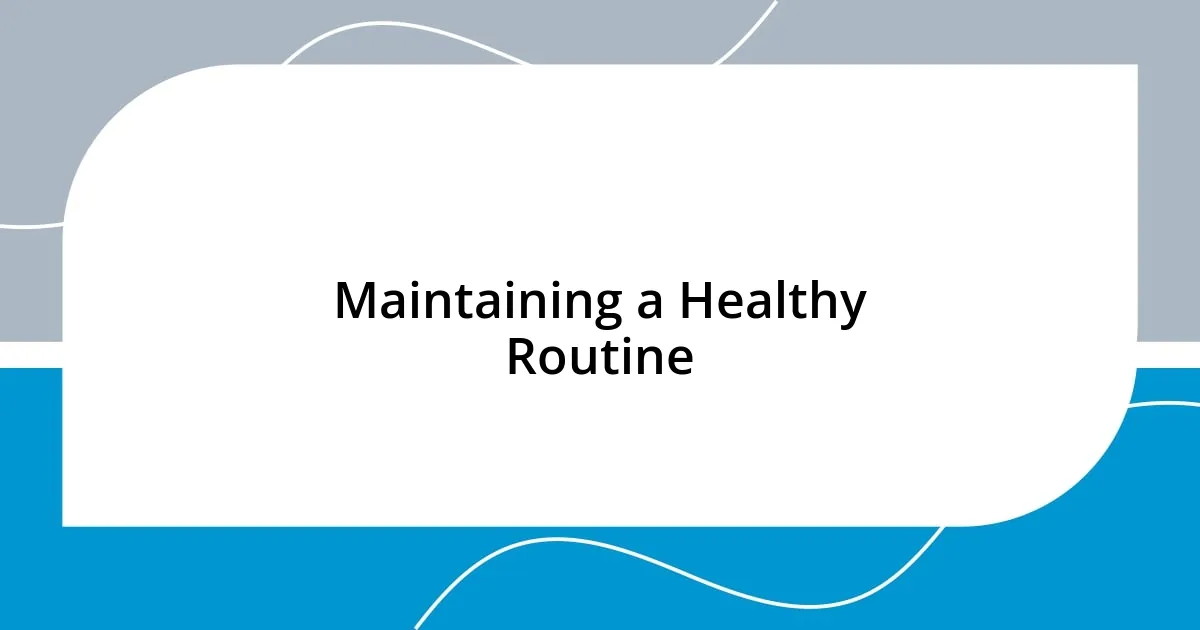
Maintaining a Healthy Routine
Maintaining a healthy routine plays a crucial role in my mental well-being. I’ve discovered that prioritizing consistent sleep, nutrition, and exercise significantly contributes to how I feel each day. For instance, I’ve started going to bed and waking up at the same time, even on weekends. Have you noticed how much better you function when you’re well-rested? I certainly do—it’s like turning the lights back on after a power outage.
Another essential aspect of my routine is incorporating short breaks throughout the day. I set a timer for every hour to stand up, stretch, or simply breathe. This practice keeps my mind fresh and can be rejuvenating. Just recently, after a few intense hours of work, I stepped outside for a few minutes. The sunlight, fresh air, and sounds of nature reinvigorated me in a way that’s hard to describe. Isn’t it amazing how just a moment outdoors can shift your entire perspective?
Additionally, I make sure to schedule time for activities that bring me joy—like painting or reading. These moments act as mini-retreats from my routine. I remember a weekend when I dedicated a couple of hours to sketching. Amid the creative flow, I felt a profound sense of peace and accomplishment. When was the last time you indulged in something you love? I’d encourage you to carve out that time; it can transform not only your day but also your mindset.
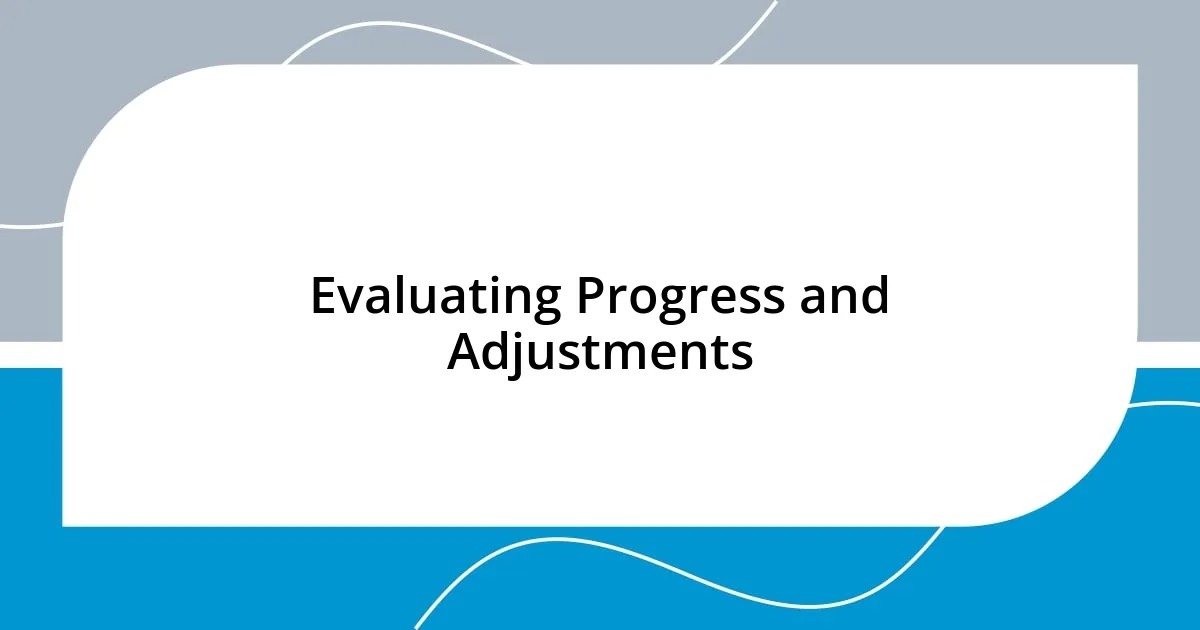
Evaluating Progress and Adjustments
Evaluating my progress in prioritizing mental health is an ongoing journey I’ve grown to appreciate. I often set specific, measurable goals for myself—like aiming for a certain number of mindful moments each week. Recently, I recorded how many times I practiced meditation, and it was eye-opening to see the fluctuations. Have you ever tracked your habits? It can be surprisingly revealing.
As I evaluate, I also reflect on what’s working and what isn’t. I recall a time when journaling felt like a chore rather than a release. After some honest self-reflection, I decided to shift my focus toward creative journaling—incorporating art and free writing instead. The change reignited my passion and made the process enjoyable again. Adapting my approach opened new doors for expression—have you considered changing your routine if it feels stagnant?
Regular assessments of my mental health practices have allowed me to make meaningful adjustments. For instance, I used to overlook taking breaks during my work routine, thinking of them as distractions. This past month, I’ve embraced the idea of a “reset,” where I step away from my work for a few minutes. The difference in clarity and productivity is remarkable! It’s a gentle reminder that sometimes, a small adjustment can lead to big changes. What adjustments might work for you?











